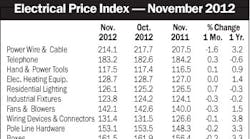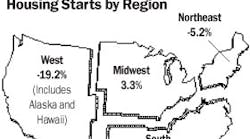The outcomes of two separate federal court actions last month in a dispute between Arlington Industries Inc., Scranton, Pa., and Bridgeport Fittings Inc., Stratford, Conn., over patent rights on a snap-in conduit fitting didn’t clarify much, except that the conflict will continue. The two lawsuits, brought by Arlington in 2001 and 2006, concluded in the same federal court district in the same month, but reached opposite results.
The complaints, both litigated in U.S. District Court for the Middle District of Pennsylvania, allege that Bridgeport’s Whipper-Snap connector infringes on patents held by Arlington for a snap-in fitting that allows installers to connect the fitting to an electrical box with one hand, without tools or lock nuts. The patents, numbers 5,266,050 and 6,521,831 (referred to in the legal documents as the “050” patent and “831” patent, respectively) describe the way Arlington’s Snap-Tite connector attaches to the box.
An earlier lawsuit claiming infringement of patents regarding the same Arlington technology — used in its Snap-2-It line — ended in 2004 with a settlement in which Bridgeport removed 24 Snap-In and Speed-Snap connectors from the market. Bridgeport subsequently introduced its Whipper-Snap connector line based on what it claims is a substantially different design. Bridgeport President Del Auray said the company has been issued seven patents regarding that design.
In the case that concluded on Sept. 1, presiding District Judge A. Richard Caputo found that Bridgeport’s Whipper-Snap connector did not infringe either the 050 or 831 Arlington patents either literally or via the doctrine of equivalents, and that Arlington was not entitled to any damages. Arlington has filed notice that it plans to appeal this decision.
In the case that concluded Sept. 25 before District Judge Christopher C. Conner, a jury found in Arlington’s favor on every count — that Bridgeport’s products violated the 050 patent, that the violation was willful, and that Bridgeport had breached its contract from the earlier settlement by selling products that were “colorable imitations” of the products at issue in that suit. The jury awarded Arlington a total of $2.8 million in lost profits and damages.
Arlington President Tom Stark told EM his company will file a motion to have the damages tripled, “based on Bridgeport’s willful conduct,” and to immediately remove the Whipper-Snap products from the market. Bridgeport said it will appeal this decision because the case should have been barred based on the judge’s ruling in the same district court in the Sept. 1 decision. Bridgeport’s attempts to stop the jury trial on those grounds before it started were unsuccessful.
How much longer this will go on is anybody’s guess. The appeal processes for the two cases could take a year. In a conference this week with both companies, Judge Conner set a timetable in which the companies have 45 to 60 days to resolve post-trial motions in the Sept. 25 case, said Stark.
According to Auray, in a separate proceeding commenced by Bridgeport before the U.S. Patent Office, the Patent Office determined that all but two claims of Arlington’s ‘831 Patent are invalid.
According to Arlington, the 050 patent gives it the right to exclude others from making products with its external adaptor ring until December 2011, while Arlington’s Snap-2-It patent gives Arlington the right to exclude others from making similar products with an external and internal ring at least until 2018. The internal ring design is not at issue, and Bridgeport has a separate patent on its own internal ring design, Auray said.
Both companies have established track records of innovation and a constant flow of new product development. Stark estimated that Arlington spends between $2.5 million and $5 million per year in product development. Auray declined to give a figure but pointed out that Bridgeport has filed for 42 patents since 2005, of which 12 have been issued, and 29 patents are currently pending.

